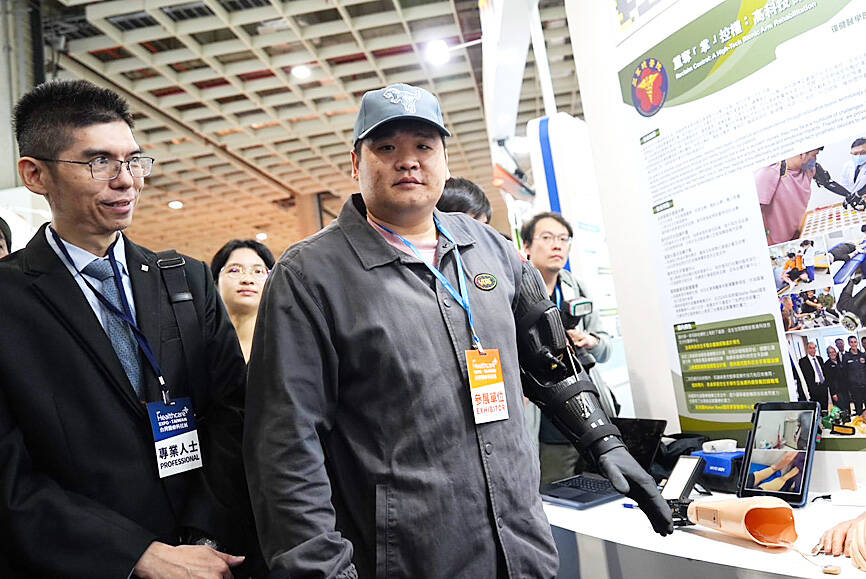An army soldier fitted with a bionic left arm has returned to duty after last year losing a limb in an ammunition depot explosion in Kaohsiung.
The service member identified as Sergeant Hung (洪) can perform 14 types of fine motor functions with the cybernetic prosthetic, a Tri-Service General Hospital spokesperson said on Dec. 5 at a medical technology expo at the Nangang Exhibition Center.
The sergeant could use the prosthesis to shake hands, grasp objects and pull the trigger of a gun, allowing him to return to normal life and military service, they said.

Photo: CNA
Hung traveled to Japan, had fewer problems with daily life than before and was recently reinstated in the 6th Army Corps, he said, adding that Hung’s biggest post-bionic arm wish is hitting the gym and getting his muscles back.
In July last year, Hung was carrying out a technical inspection of 120mm mortar shells when one of the rounds detonated, wounding nine service members nearby.
Hung sustained heavy injuries to his left arm and right leg in the blast, and was showing no signs of life until doctors revived him at a care facility, a hospital spokesperson said. His arm was subsequently amputated.
Hung wore the prosthesis for a year and trained intensively for four months to achieve proficiency with the arm, they said, adding the artificial limb’s latency for trained users ranges from half a second to one second.
Chang Chih-ya (張智雅), head of the physical medicine and rehabilitation department, said the bionics program at the Tri-Service General Hospital stemmed from collaboration with Ottobock Co in Germany.
More than 30,000 people have lost limbs in the ongoing Russian invasion of Ukraine, spurring the development of artificial limbs with improved functionality, he said.
The two institutions created the cybernetic arm and rehabilitation regimen used to restore Hung’s arm, he said.
The bionic arm uses sensors to read electronic signals sent by the nerve endings of the stump, enabling a trained user to manipulate the artificial limb at will, he said.
The life-like contours are designed to be more aesthetically pleasing and reduce disruption to social life, Chang said.
Tu Lien-shui, director of Taiwan O and P Co, one of the project’s corporate partners, said the next step in cybernetics is to utilize implant technology to increase precision and responsivity.
The hospital and its partners are also working on 3D printers to make bionic prostheses more affordable, he added.

Costa Rica sent a group of intelligence officials to Taiwan for a short-term training program, the first time the Central American country has done so since the countries ended official diplomatic relations in 2007, a Costa Rican media outlet reported last week. Five officials from the Costa Rican Directorate of Intelligence and Security last month spent 23 days in Taipei undergoing a series of training sessions focused on national security, La Nacion reported on Friday, quoting unnamed sources. The Costa Rican government has not confirmed the report. The Chinese embassy in Costa Rica protested the news, saying in a statement issued the same

Temperatures in New Taipei City’s Sindian District (新店) climbed past 37°C yesterday, as the Central Weather Administration (CWA) issued heat alerts for 16 municipalities, warning the public of intense heat expected across Taiwan. The hottest location in Taiwan was in Sindian, where the mercury reached 37.5°C at about 2pm, according to CWA data. Taipei’s Shilin District (士林) recorded a temperature of 37.4°C at noon, Taitung County’s Jinfeng Township (金峰) at 12:50 pm logged a temperature of 37.4°C and Miaoli County’s Toufen Township (頭份) reached 36.7°C at 11:40am, the CWA said. The weather agency yesterday issued a yellow level information notice for Taipei, New

Taiwan’s Liu Ming-i, right, who also goes by the name Ray Liu, poses with a Chinese Taipei flag after winning the gold medal in the men’s physique 170cm competition at the International Fitness and Bodybuilding Federation Asian Championship in Ajman, United Arab Emirates, yesterday.

A year-long renovation of Taipei’s Bangka Park (艋舺公園) began yesterday, as city workers fenced off the site and cleared out belongings left by homeless residents who had been living there. Despite protests from displaced residents, a city official defended the government’s relocation efforts, saying transitional housing has been offered. The renovation of the park in Taipei’s Wanhua District (萬華), near Longshan Temple (龍山寺), began at 9am yesterday, as about 20 homeless people packed their belongings and left after being asked to move by city personnel. Among them was a 90-year-old woman surnamed Wang (王), who last week said that she had no plans